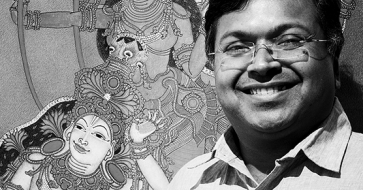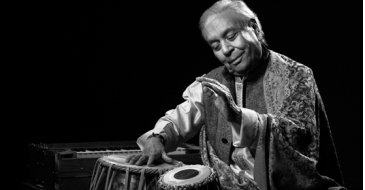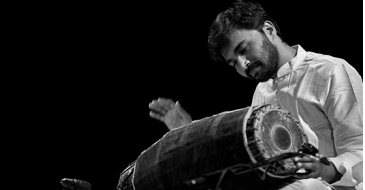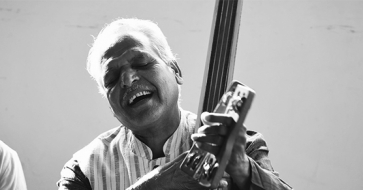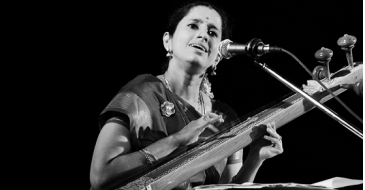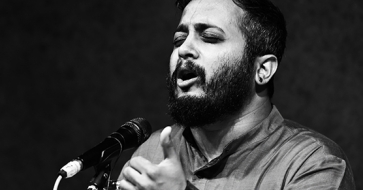You speak of Indian classical music as a vehicle to instill and carry forward cultural heritage. Can you please elaborate on that?
Indian classical music is a vehicle to understand and appreciate the rich cultural heritage that our ancestors and sages have created for us. As we delve deep into the rich cultural traditions of the different states of India like Tamil Nadu, Bengal, Gujarat and Maharashtra, we get to understand and revel in the path and teachings of our great gurus. This path can help us find our true purpose and give us pure bliss. We will never find this if we are stuck in a career performing music for the sake of money.
What makes you say so?
My personal journey. I started learning Carnatic music in Kerala when I was three. I moved to Chennai when I was 20, seeking better performance opportunities. Apart from singing, I played the harmonium in more than 300 concerts and the mridangam in more than 200 concerts. Somehow, I always felt I was not doing any of this to the best of my potential. It seemed as though I was constantly in search of perfection.
Sitting at the Marina beach, I used to wonder "What is Kuldeep Pai, a Konkani boy brought up in Kerala, doing with music in a place like Chennai, that has so many ace performers?" There must be some purpose to all of this. Thus, began my journey into spirituality. I started questioning whether music was a way to further my own desire or was there something larger to it? We sing Nidhi Chala Sukhama (does material wealth give bliss?) but we perform concerts for money. We sing Nara Stuti Sukhama (does praising a mortal give bliss?) but we run behind concert organizers who give us opportunities.
Carnatic music is not for performance. It is one's way or expression of seeking God. This expression is what we have commercialized today. I felt completely liberated once I got this much-needed clarity.
What exactly did that lead to?
The musical series Vande Guru Paramparam. The culmination of my 33-year-long personal search for perfection. In this, we respectfully explore the traditions of our gurus and sages.
When children come to me and sing, I know within the first two lines that they sing, if they have the seed of spirituality within them. That is what I look for more than sheer musical talent
Vande Guru Paramparam features children. How, in your music journey, did you meet children and when did you decide that you’d focus on nurturing their talent?
Sooryagayathri was the first child I worked with. Earlier, I used to compose music for leading telecom companies to earn a living. One of the companies wanted me to record Hanuman Chalisa. Smt M S Subbulakshmi's version has been the most popular one for many years now and that tune has registered in the minds of so many listeners. While I was thinking of doing something conceptually different, this thought of getting a child to sing it occurred to me. Soorya's father had played mridangam for me in the past and had sent me a clip of her singing. When I heard it, I knew when she sang the first line itself that she was different. She learnt Hanuman Chalisa incorporating my inputs. We did not even have a professional video recording set-up then and shot the song with just a mobile phone.
At about the same time, I had tuned some compositions of my spiritual guru, Acharya Shri Nochur Venkataraman. He was not convinced with one of the compositions for which I had compiled a detailed orchestration — I thought it fit well instead, for the Ganesha Pancharatnam and I set it to that orchestration. I would say that it is the Guru's grace that the tune which was initially set for him, rebound to me through him, at the right time. Ganesha Pancharatnam was an instant hit and became viral on social media.
So, both Hanuman Chalisa and Ganesha Pancharatnam happened. I had clarity on where this journey was taking me only after working with Sooryagayathri. The other children started coming after that.
What are amongst the qualities you look for when you take a child under your wings?
I only look for a spark of spirituality and purity in them. This gets manifested differently in different children. Some children may be musically very talented but may totally lack this. In fact, my mailbox is flooded with emails seeking opportunities to work with me. These come with videos of kids who are supposed to be very talented. They do not inspire me unless I can see the seed of spirituality in them. They have other platforms to go to like competitions and shows on television.
How do you know which child has the seed of spirituality?
It's completely intuition. I can spot this within the first two lines they sing. My belief is that they come to me at the right time designated by the Supreme Universal Force. Many children go for music classes and can sing. But only one in a lakh have the spiritual seed manifested in them. Children like Sooryagayathri or Rahul Vellal are like that. Let us take the example of Raghuram Manikandan who has sung Tamburi Meettidava. I got a video clip of Soorya and Raghuram singing together and I could immediately sense the spark in him.
What do you exactly work on with these children?
I should clarify here that these children are not my direct disciples. They learn music regularly under their respective gurus. I work with them on specific songs, help with detailing and try to bring out the best in them. For this, we need to understand the meaning, the modulations to be done, the dynamics, etc. We need to work on the songs and practice them multiple times to get as close as possible to perfection. For example, Sooryagayathri practiced Hanuman Chalisa as a sadhana (disciplined, dedicated practice) for 108 days before recording; Vishnu Sahasranamam was practiced for a whole year before we did the final recording. Here, I must acknowledge two people who help me with the detailing and are like the extensions of my being — S Ganapathi ji takes care of the musical arrangements and live percussion and Sharanya Bharathwaj ji takes care of all the creative support. I value their work a lot.

What goes into that act of nurturing? Is it merely about learning a song or are you, in a sense, teaching them a way of life?
Nurturing is not about regular music classes. It is about delving in-depth into the song and developing the seed of spirituality within the children. It is only then that their singing can touch the hearts of people.
When you perform in a concert, you have to worry about so many parameters. When you sing for the universal force, you don't have to worry about anything. You simply sing. Even if you achieve a lot of worldly things in the process, you will eventually get bored with all of that and then start using your art for spiritual sake. You will transcend the need to earn money for survival — I am at such a stage today. You can thus see that it is all about a way of life; of deriving peace from art and not about the usual journey to worldly fame. The children I am working with have all started early. Their life is changing beautifully.
Is it important for them to start young?
Yes. There are no commitments at a young age — no bills to be paid; nothing much to worry about. They can just keep listening to all the good things in the environment around and keep absorbing them since their minds are fresh. In fact, it would be ideal to expose them to Carnatic music right from when they are in their mother's womb. But we end up wasting their childhood by allowing them to spend a bulk of their time in conventional schools. Instead, they can spend five hours a day in traditional arts along with homeschooling — this will do them a world of good. Good things will get retained and clarity will emerge. Even if they struggle with worldly matters during adulthood, they will come back saying that is not their best. Whatever they learnt in their early years will then come to their aid and save them.
What is it about teaching children that you enjoy? How different are they from the way adults respond to training? Can you share a story or two with us?
I see the manifestation of the supreme in children. I can see so many qualities that are representative of that — the innocence, the selflessness, the lack of ego, etc. Children just absorb all the good things you tell them. They understand when I explain to them why something is not proper. I love to be part of the detailing process with them.
Adults accumulate a lot of baggage through their life. You need to spend a lot of energy getting rid of that baggage and I do not want to waste my energy doing that. Their thoughts are usually about things like what is in it for them, will they become famous, how much will they get paid, etc. Otherwise, there is a lot of clash, unless the person is also spiritually very well-evolved.
I love working with machines and children. Machines if maintained and treated well give good results. Children do the same if taught and guided well.
Carnatic music is a vehicle to understand and appreciate the rich cultural heritage that our ancestors and sages have created for us. I am doing this through Vande Guru Paramparam
A teacher has an important role to play but so does the student; how do you motivate them to feel inspired to pursue this art form?
As I said, I am not a regular music teacher for these kids. There are many others to play that role. My role is to show the children the greatness of our gurus, their teachings and the rich cultural heritage we have. While working on the songs, we work on a lot of detailing — what musical patterns do we employ, do they go with the lyrics, do they do justice to the bhava with which the composer has composed, etc. For example, they understand that a song like Nagumomu Ganaleni, where the composer is lamenting about missing the charming, ever-smiling face of Lord Rama and requesting to be taken into his fold, cannot be sung to racy beats like it is done today in concert platforms. They understand how the lyrical, musical and spiritual value should all be present in what they sing — this motivates them.
They also understand their purpose. When they travel, they may stay in a five-star hotel one day. The next day, they may be in an ashram with minimal comfort. They see the contrast and learn about life. They learn not to attach too much value to such things. They learn about how saint composers led their life. All of this permeates into their being and works on them.
The other thing you have to note is that their success has also motivated them beautifully. They have transcended the sabha culture. They know their work is reaching so many people and there is some responsibility that lies with them. The success has not gotten into their head. I make sure I tell them that this worldly success is not important. They should just keep doing their work and practice regularly.
We also live in a very distracted world; how do young children feel inspired to take time off their schedules and pursue music as an important aspect of their lives?
The children have tasted success. Instead of getting into their head, it has taken them on a beautiful journey. So, they prioritize this over other distractions. Some, like Sooryagayathri, also do not waste much time in conventional schooling. She has the permission to skip regular classes at her village school and just come to write the exams. Others like Rahul Vellal and Raghuram Manikandan live in cities and attend regular school. The truth is these children are special and do not need more than two hours a day to attend to worldly compulsions. The rest of the time can be spent in this pursuit. When children are ready to go on this journey, the universe conspires to make things happen for them.
How do you instill the idea and importance of rigour in a child's life?
It is all about the detailing that I spoke about. The children have a special relationship with me. They talk freely and can ask or say anything. They trust me completely. They are totally committed to putting in the hard work that is required. People who watch the songs convey their appreciation. We have subscribers even in countries like Pakistan who watch and appreciate our work. Each song gets viewed and shared more than a million times. The success that comes out of their work reinforces to them the importance of rigour and motivates them to keep pursuing that rigour. They learn compositions of composers like Saint Tyagaraja and the works of Adi Shankara and wonder how these have stood the test of time and are still popular whereas many commercial songs that are produced today do not even stay in people's memories for a few months. Many performers would have pursued music to earn a living even during Saint Tyagaraja's times. Why do we not know about any of them today?
When a young child sings a song that is based on a God, what is his or her understanding of it? Is he or she just literally singing a song learnt well? Do you think there is more to it? How are children emoting that idea of bhakti? What is their perception of such 'elevated' concepts?
These are all confusions that exist in our brain. We think that only when we complete so many years of formal schooling will we be able to understand certain concepts. However, you cannot get these concepts if your understanding is purely brain-based. The realization we are referring to happened even to the animals who lived with Ramana Maharishi in his ashram.
The sheer purity in children when they sing a song itself conveys many things. That purity comes from the supreme force. It touches the heart. You feel contentment when you listen to them perform. You don't feel like clapping like you do after concert performances. You get to experience silence and the pure bliss in it.
Having said that, each child has his or her own journey. The way they sing now may be different from the way they sing at the age of 20, or at the age of 30 as they experience life. However, whenever they come back to their original purity, they will have a different experience and be able to have a different impact.
How did you learn this art form and how different or similar is it to the way you impart knowledge?
I learnt in the conventional way, by going to regular music classes with performing well being the end goal. When I teach now, I make sure that I focus on the quality and not on quantity. We do not go after material success. We get into details of every aspect of the song. It takes me at least a month to work on a song with a child. The children also understand and appreciate the fact that they are able to sing and convey better with the detailing and nuances that I help them with. Ultimately, what I impart to them is a way of life where what they seek can be used to attain peace and pure bliss.
Learning is one thing, performance quite another. How do you create performers?
It is all to do with the detailing. It is not about attending an hour's music class. It is about working together to analyze each and every bit of the song and making sure the lyrical, musical and spiritual values are preserved. The kids I choose to work with are extraordinary. They are capable of working with me on this and of being taken in the spiritual path.
Do you think the act of performance sometimes takes away from the importance of process?
Yes. Carnatic music is for the pooja room and for yourself. It is not for performance and for pleasing thousand people. It is for your internal growth. Once you are on that path, you realize that performances disturb your peace. Sometimes you realize that even music itself is secondary. The silence is what inspires you then.
What do you feel when a group of your children perform, and perform well? Is it a sense of achievement or pride?
Producing each song is like giving birth to a child. It involves so much of hard work. It is penance. There is so much perfection in the way they have been trained. We follow the spiritual way. All this gets reflected finally in the way the world sees them performing the song.
So, I feel contentment when the children perform. That is all I seek. The rest like commercial success are byproducts that will happen automatically. Many telecom companies have offered me crores of money for signing multi-year contracts. A well-wisher in the US offered me a similar sum to set up a studio in the US and to work with the children there. But all this doesn't move me — working with children like Sooryagayathri is what does. I am not their official teacher, so, there is nothing for me to claim here. It is blissful just to understand that I am a beautiful instrument in this process.

We are curious about what happens to a child when he or she gets famous and into the limelight, very young. What is your thought on this?
Most musical decisions in the life of the children who work with me are taken by their respective music teachers. Almost all other decisions are taken by their parents. Therefore, I cannot say for sure what decisions will be made and how life will unfold for them. Let them explore and face life. Good things will happen. They will also face a lot of challenges. Their parents are supporting them today. They may have to be on their own tomorrow and deal with the world by themselves.
I believe I am an instrument in their spiritual evolution. I am witnessing them evolve so beautifully. I am putting the seed into them that fame should not get into their heads. I believe they have understood this very well. If not, at some point of time in their life, when they experience the ways of the world, they will understand what Kuldeep Pai was trying to tell them when they were young. If they pursue their current path seriously, the supreme force will guide them and take them along. If they don't, then their path may change — that is not in my hands.
Producing each song is like giving birth to a child. It involves so much of hard work. It is penance. There is so much perfection in the way they have been trained
Also, do you wonder if children grow up too soon, the moment they get adulation and fame? What is your take on this?
If the children are brought up well, the fame can take them to the next level. The kind of success seen by children working with me is not an ordinary one. For example, Sooryagayathri is a household name not just in South India but to the whole of India and in many countries across the world. After seeing worldly success at such a young age, they actually get bored of it. Soon they realize they are on a different path altogether. Like me, these children have transcended the ordinary and are doing wonderful things in this world.
What impact does Vande Guru Paramparam have on your viewers?
I can tell you a few examples from the emails I get from the viewers. A lady living abroad wrote to me about how she took permission from her gynecologist to have music from our channel playing while she gave birth to her child. Even infants of age 3 to 10 months are responding to this music.
Our focus is not on how to get more people to hear it or how to make money. Just like a sweet dish always attracts ants without you needing to invite them, such detailed work will attract people. We have reached more than 21 crore official views in three years. Each day we have four lakh official views on the channel. The subscriber count is growing each day and is nearing seven lakhs at present! We have no track of how many people share it through different means. I am happy that Vande Guru Paramparam is today touching the lives of millions of people around the world. I wish one day it reaches all of humanity.
How has all of this impacted your life?
Vande Guru Paramparam has provided me true freedom. There are no intermediaries in the research and production of the content. I have complete freedom in how I want to present the content. For example, in our Vaishnava Janato video, I decided to include all the four charanams (paragraphs in the end) in the song since I loved all of them and was brimming with universal love while studying and working on them. Any other producer would have allowed only one of them to be recorded since the tune for all four is the same.
Another change is that I have started to enjoy the beauty of silence. I get great ideas from that.
As I pursue this path, I see that all the opportunities I was once chasing are now coming to me on their own. I do not run behind money. Offers keep coming on their own. But I am no longer interested in the rat race.
Each one of us here are instruments of the supreme with the ability to influence and inspire many others. This is not about individuals like Kuldeep Pai or Sooryagayathri but about the cause. This is a very serious responsibility.
Interviewed by Ramkumar R
0 comments Comments





